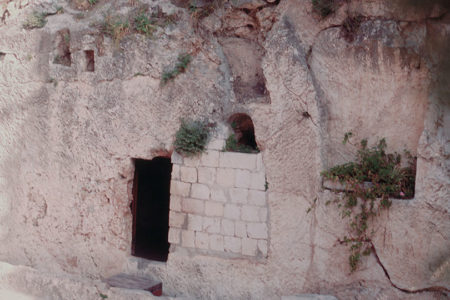Israel’s Future Redemption
Hosea 14:1-9
EDITOR’S NOTE: This article concludes our series on the book of Hosea. Look for David Levy’s new series on the book of Micah in the May/June issue of Israel My Glory.
It is never easy for people to confess their mistakes. Whether it is a spouse seeking to rebuild a marriage or an individual seeking redemption from God, admitting blame usually is difficult. And it was difficult for ancient Israel. In the days of Hosea the prophet, the Lord sought to redeem His Chosen People from their lives of spiritual infidelity and immorality by convincing them to return to Him. In chapter 14, Hosea closed his revelation with a final plea regarding what Israel must do to receive forgiveness of sin and be reconciled to the Lord.
A Plea to Repent
Hosea clearly stated that before Israel can be restored, she must come to the Lord in repentance:
O Israel, return unto the LORD, thy God; for thou hast fallen by thine iniquity. Take with you words, and turn to the LORD; say unto him, Take away all iniquity, and receive us graciously; so will we render the calves of our lips (vv. 1–2).
The prophet’s call for Israel to return in repentance is a major theme of this book (2:7–9; 3:5; 5:4; 7:10, 16; 11:5; 12:6), occurring four times in this chapter alone (vv. 1–2, 4, 7). Israel’s return was not to be halfway or halfhearted but a total surrender to the Lord.
Hosea provided three conditions that Israel must meet before she can be reconciled to God. First, Israel’s “words” (v. 2) of repentance must express a heartfelt prayer for pardon as she confesses her sins to the Lord. Second, in turning to Him with her whole heart, not her lips alone, Israel must petition God to remove her specific sin of “iniquity” (v. 2). The word iniquity best describes Israel’s rebellion, deceitfulness, perversity, and crookedness. Finally, Israel’s people must ask the Lord to receive them “graciously” (v. 2).
The Lord will receive Israel when the nation comes to Him in a spirit of repentance, using the words He requires from them. In the past, Israel offered sacrifices out of habit. Now the nation must propitiate God, not by sacrifices or gifts of gold and silver but by rendering Him the “calves [fruit] of . . . [their] lips” (v. 2). In other words, Israel was to worship God sincerely, by expressing heartfelt praise when seeking forgiveness, rather than by merely offering the perfunctory animal sacrifices.
Israel’s words must be accompanied by actions. If the nation is to receive God’s forgiveness, she must forsake three besetting sins: her trust in foreign alliances, military equipment, and idols. The nation must renounce reliance on Assyria for help, deliverance, and security (v. 3) and depend instead on God. She must say, “We will not ride upon horses” (v. 3) because horses and chariots were military equipment imported from Egypt for defense. God strictly forbade the Israelites to “multiply horses,” but they did so anyway in direct rebellion to His command (Dt. 17:16). This action showed that the nation lacked trust in God. Israel was not to put confidence in worldly power or human aid but was to trust only in the power of the Lord for deliverance.
Israel also must stop practicing idolatry: “Neither will we say any more to the work of our hands, Ye are our gods” (v. 3). The practice of seeking spiritual help and blessing from deaf and dumb idols was to be forsaken forever.
In the final analysis, Israel must realize that her only hope is in God, where “the fatherless findeth mercy” (v. 3). Man without God is like a fatherless creature that is no better off than a weak, forlorn orphan. Being an orphan implies a lack of identity, parental relationship, and care. Without God, Israel is fatherless, friendless, and helpless, like so many poor orphans.
Earlier in this book, Hosea named his children “not pitied” and “not my people,” symbolizing that God had severed His relationship with Israel. Deprived of all help, Israel will come to realize that God alone is the One in whom she can find mercy, love, forgiveness, and ultimate deliverance.
A Promise to Restore
God will respond to Israel with compassion and consolation when she comes to Him in genuine repentance, with a contrite heart. Then He will grant the nation favor and forgiveness, restoring Israel in three ways. First, He “will heal their backsliding [apostasy]” (v. 4). Such healing includes curing her of idolatry, rebellion, immorality, and renewing her covenant relationship with the Lord.
Second, God promises, “I will love them freely; for mine anger is turned away from him” (v. 4). Despite the centuries of Israel’s rebellion and idolatry, the Lord continues to love the nation freely. His love for Israel is voluntary, spontaneous, and a free gift that is totally unmerited (cf. Jer. 31:3). Just as all believers today are justified freely by faith through God’s unmerited grace, so Israel will be justified at Messiah’s Second Coming. Only then will God’s anger turn away completely from His people.
Third, God said, “I will be as the dew unto Israel” (v. 5). He will renew Israel’s blessing and pour it out like the heavy evening dew on the land. Heavy night dew refreshes and revives a sun-scorched land and provides the moisture necessary to bring about new life—an apt picture of the Lord’s blessing on Israel after centuries of a dry and barren spiritual life. Israel will experience this prosperity and fruitfulness during the Millennial Kingdom.
When Israel, at last, experiences redemption and renewed fellowship with the Lord, “he shall grow [blossom] like the lily, and cast forth his roots like Lebanon” (v. 5). A lily is a delicate plant that grows rapidly and reproduces abundantly, and its long stem bears a beautiful flower that emits a pleasant fragrance. Although the lily is beautiful, its shallow root system means it also dries up quickly and dies. Thus Hosea compared Israel’s root in the time of her redemption to the cedars in Lebanon. Their roots descend deep into the mountain soil and easily support massive growth and weight, enabling the trees to grow strong, tall, and stately, piercing the sky. Israel, who has been uprooted often throughout her history, will, in the day of her redemption, be rooted in her land forever. The nation will be as strong and stable as the cedars of Lebanon because she will be planted in the Lord.
Hosea also mentioned three more results of Israel’s redemption: “His branches shall spread, and his beauty shall be like the olive tree, and his fragrance like Lebanon” (v. 6). These branches represent Israel’s expansion and numerical growth during the Millennium. In that day, Israel’s beauty will be like the olive tree, whose green foliage and fruit production symbolize the nation’s holiness and spiritual vitality. Israel’s fragrance will be like cedars of Lebanon, which emit an aroma that delights all who experience it. In the Millennium, Israel will be acceptable to God; and her loveliness, pleasing to man.
In verse 7, the simile becomes a metaphor:
They that dwell under his shadow shall return; they shall revive like the grain, and grow [blossom] like the vine; the scent of it shall be like the wine of Lebanon (v. 7).
Some teach that the metaphor refers to the Lord as a great tree and to Israel as dwelling under His shadow in the Millennium. Others believe the tree represents the nation of Israel, to whom individual Jewish people return at the inception of the Millennial Kingdom. The latter interpretation is consistent with the similes of the previous two verses, which compare Israel with the trees of Lebanon. The people who have been regathered and restored to the land will be revived physically and spiritually, like grain that springs up in abundance. In that day, Israel will “grow [blossom] like the vine” (v. 7), a sign of great prosperity. The “scent” of Israel’s restored reputation will be like the wine of Lebanon that surpasses all others in aroma, taste, and value.
Furthermore, Israel will abhor idolatry: “Ephraim shall say, What have I to do any more with idols?” (v. 8). The nation will surrender completely to God and never practice idolatry again.
The Lord will accept Israel’s repentance: “I have heard him, and observed him; I am like a green fir tree. From me is thy fruit found” (v. 8). After Israel’s repentance and redemption, the Lord will be like a green fir tree, providing the nation with shelter and security. The fir tree is an evergreen, symbolizing fruitfulness from the Lord, who will supply every spiritual and material blessing that Israel needs in the Millennial Kingdom. What a change from Israel’s situation in Hosea’s day!
Appeal to Return
Hosea concluded his prophecy with an appeal for Israel (and people everywhere) to heed God’s counsel:
Who is wise, and he shall understand these things? Prudent, and he shall know them? For the ways of the LORD are right, and the just shall walk in them; but the transgressors shall fall in them (v. 9).
A wise person (one who can discern spiritual, scriptural truth) and a prudent person (one who lives according to it) will learn three lessons from Hosea’s prophecy. First, the “ways of the LORD are right.” They are the right path for us to take because, when we follow His ways, God guides, governs, and guards us in the way we should live. Second, “the just shall walk in them,” meaning righteous people will obey God and, in so doing, experience and enjoy the Lord’s blessing. Third, “the transgressors shall fall [stumble] in them.” People who refuse to follow God’s ways are transgressors, as were the people mentioned in Hosea’s prophecy. Sin causes transgressors to stumble and fall, relegating them to the same unfortunate fate prophesied in this book.
God calls on the readers of His prophecy to repent, return to Him, and experience the redemption available to them. The prophet summed it up well when he wrote, “O Israel, thou has destroyed thyself, but in me is thine help” (13:9).
Despite dire circumstances, Hosea stayed faithful to God’s call on his life, living with an adulterous wife amid a rebellious people. God honored Hosea’s faithfulness, for in time, Gomer was reunited and reconciled to her husband. Although the prophet did not live to see it, one day Israel will be reunited and reconciled to God in righteousness. The Lord greatly used Hosea as he boldly proclaimed what was right to his family and nation. May Hosea’s example inspire each of us to be more diligent and faithful in our commitment to the Lord in these last days.







